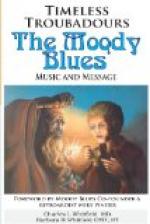it must be said that the majority of his poems are
far from attaining this ideal. Their obscurity,
however, is often due rather to the difficulty of the
subject matter than to any intentional attempt at
preciosity of style. He was one of the first
troubadours who attempted to analyse the effects of
love from a psychological standpoint; his analysis
often proceeds in the form of a dialogue with himself,
an attempt to show the hearer by what methods he arrived
at his conclusions. “How is it, in the name
of God, that when I wish to sing, I weep? Can
the reason be that love has conquered me? And
does love bring me no delight? Yes, delight is
mine. Then why am I sad and melancholy?
I cannot tell. I have lost my lady’s favour
and the delight of love has no more sweetness for
me. Had ever a lover such misfortune? But
am I a lover? No! Have I ceased to love passionately?
No! Am I then a lover? Yes, if my lady would
suffer my love.” Guiraut’s [55]
moral
sirventes are reprobations of the decadence
of his age. He saw a gradual decline of the true
spirit of chivalry. The great lords were fonder
of war and pillage than of poetry and courtly state.
He had himself suffered from the change, if his biographer
is to be believed; the Viscount of Limoges had plundered
and burnt his house. He compares the evils of
his own day with the splendours of the past, and asks
whether the accident of birth is the real source of
nobility; a man must be judged by himself and his
acts and not by the rank of his forefathers; these
were the sentiments that gained him a mention in the
Fourth Book of Dante’s
Convivio.[22]
The question why Dante should have preferred Arnaut
Daniel to Guiraut de Bornelh[23] has given rise to
much discussion. The solution turns upon Dante’s
conception of style, which is too large a problem for
consideration here. Dante preferred the difficult
and artificial style of Arnaut to the simple style
of the opposition school; from Arnaut he borrowed
the sestina form; and at the end of the canto he puts
the well-known lines, “Ieu sui Arnaut, que plor
e vau cantan,” into the troubadour’s mouth.
We know little of Arnaut’s life; he was a noble
of Riberac in Perigord. The biography relates
an incident in his life which is said to have taken
place at the court of Richard Coeur de Lion.
A certain troubadour had boasted before the king that
he could compose a [56] better poem than Arnaut.
The latter accepted the challenge and the king confined
the poets to their rooms for a certain time at the
end of which they were to recite their composition
before him. Arnaut’s inspiration totally
failed him, but from his room he could hear his rival
singing as he rehearsed his own composition.
Arnaut was able to learn his rival’s poem by
heart, and when the time of trial came he asked to
be allowed to sing first, and performed his opponent’s
song, to the wrath of the latter, who protested vigorously.
Arnaut acknowledged the trick, to the great amusement
of the king.




